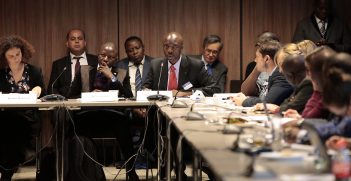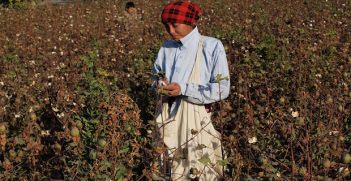ICC Turmoil as African Nations Withdraw

It has been an extraordinary month for the International Criminal Court. Unrelenting criticism from African nations resulted in the withdrawal of three states from the court, destabilising this pillar of international criminal justice.
On 18 October 2016, Burundi became the first African nation to announce its withdrawal from the International Criminal Court (ICC). When President Pierre Nkurunziza signed legislation declaring his country’s intention to rescind its membership to the ICC, shockwaves rippled through Africa and across the globe. A nation had finally acted on the hostile rhetoric that has been characterising discourse between the continent and the ICC since it was established under the Rome Statute in 2002. It was initially uncertain whether Burundi would be an isolated case. However, given recent events it is clear that this small central African nation set an alarming precedent.
The second blow to the ICC was dealt by South Africa on 21 October 2016 when President Jacob Zuma notified the United Nations Secretary-General of the country’s intention to withdraw membership. Enmity between South Africa and the ICC had been escalating in recent years. Indeed, tensions reached a critical point last year over the arrest warrant of Sudanese President Omar al-Bashir.
Whilst Sudan is currently not a member of the ICC, al-Bashir is wanted by the ICC for crimes of genocide and crimes against humanity—specifically in relation to the war-torn Darfur region. South Africa’s granting of immunity to the Sudanese president during his visit to the country for the 2015 African Union summit meeting sparked outrage in the international community and splintered the nation’s allegiance to the ICC.
The withdrawal of South Africa was a notable setback for the ICC. South Africa, under the political leadership of Nelson Mandela, was one of the founding states of the ICC. Given the country’s recent experience of apartheid and human rights abuses, it welcomed the ICC’s permanent role in The Hague for adjudicating international criminal justice, with a mandate including war crimes, genocide and crimes against humanity. The decision thwarted the Mandela legacy.
Subsequently, on 26 October 2016, The Gambia became the third and latest African nation within a two-week period to announce its withdrawal from the court. This was a particularly devastating blow to the court given that Chief Prosecutor Fatou Bensouda was formerly The Gambian justice minister.
Aversion to the ICC is, however, widespread across the African continent. Since the court’s inception, it has pursued predominantly African cases, creating the impression that it disproportionately targets the continent. This has gradually led to a hostile and disenfranchised African mandate, with some states arguing that the ICC is a postcolonial tool to subjugate African nations to political and judicial Western influence. The ICC consistently rejects claims of bias.
In response, Fatou Bensouda, the ICC Chief Prosecutor stated “when we open investigations, it means that our criteria have been met, that the crimes have taken place and it is grave enough to warrant the intervention of the ICC.” She said that African cases were in no way prioritised on the ICC’s legal agenda.
A pertinent question thus arises: why now? Arguably, there has been no remarkable event that could justify this sudden and audacious withdrawal of several states from the ICC. In the case of South Africa, events in 2015 may have laid the groundwork for the nation’s intention to withdraw. The country’s regression could then be explained in terms of some form of herd mentality, insofar that Burundi’s departure eased the course of withdrawal for the nation that had once been a champion of the ICC. However, President Zuma cited inconsistencies with domestic law and the Rome Statute—the international treaty that gave effect to the ICC—in his reasons for quitting the ICC. Critics have also noted mounting domestic political pressure on Zuma and corruption scandals as incentives to remove the country from the focus of the ICC.
Conversely, in relation to The Gambia and Burundi, both nations are currently being probed for purported human rights abuses amidst a recent surge in politically-charged violence. Remaining a party to the ICC kept these nations under the focal lens of the court for breaches of international law. However, if such states decided to withdraw membership to render themselves immune from investigation from the ICC, that decision was severely misguided. Any state that was once a member state of the ICC may be investigated for any conduct preceding withdrawal. Withdrawal is also only official one year after the UN is formally notified of the state’s decision to revoke its membership to the ICC.
Even if ‘why’ cannot be firmly answered now, it is critical to contemplate the immediate ramifications of these developments. As recent events suggest, the ICC is an embattled legal organ in the international sphere. Precisely what these developments indicate for the future of the court remains ambiguous. These events do not, however, mark a total dissolution of international law or of the legitimacy of the ICC. They do, instead, signify that there is now a tangible movement against the ICC within Africa.
Despite recent events, the relationship between the African continent and the ICC remains dynamic and complex. There is not a clear dichotomy between support for and hostility against the ICC—and to suggest there is obfuscates the matter. At an African Union Summit Meeting earlier this year, the Democratic Republic of Congo, the Ivory Coast, Nigeria, Senegal and Tunisia spoke out against a Kenya-driven mass exodus from the ICC. Additionally, both the governments of Botswana and the Ivory Coast have recently affirmed that they have no intention of following the course of South Africa, Burundi and The Gambia
Undoubtedly this year could mark a turning point for the role of the ICC in international justice. On 16 November 2016, representatives from member states of the ICC and delegates from NGOs across the world will convene in The Hague for the 15th Annual Session of the Assembly of States Parties to discuss the future of the ICC and current legal issues in the international community. This recent movement against the ICC and divisive antipathy in its African mandate will be notably topical. It is critical that this forum is used to discuss how to preserve the role of the ICC in administering justice to the African continent.
Sarah Barrie is a former intern at the ACT Branch of the AIIA. She is currently studying a combined Bachelor of Laws (Honours) and Middle Eastern and Central Asian Studies at the Australian National University.
This article is published under a Creative Commons Licence and may be republished with attribution.





